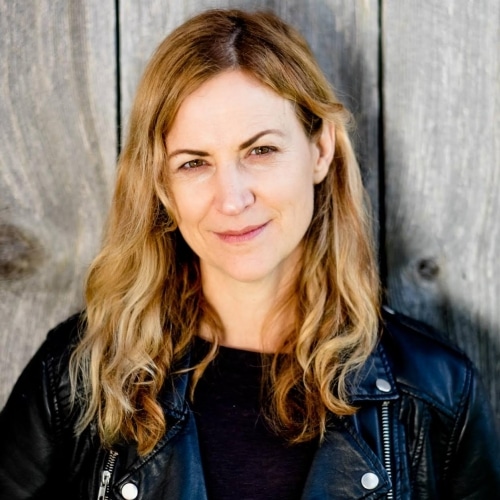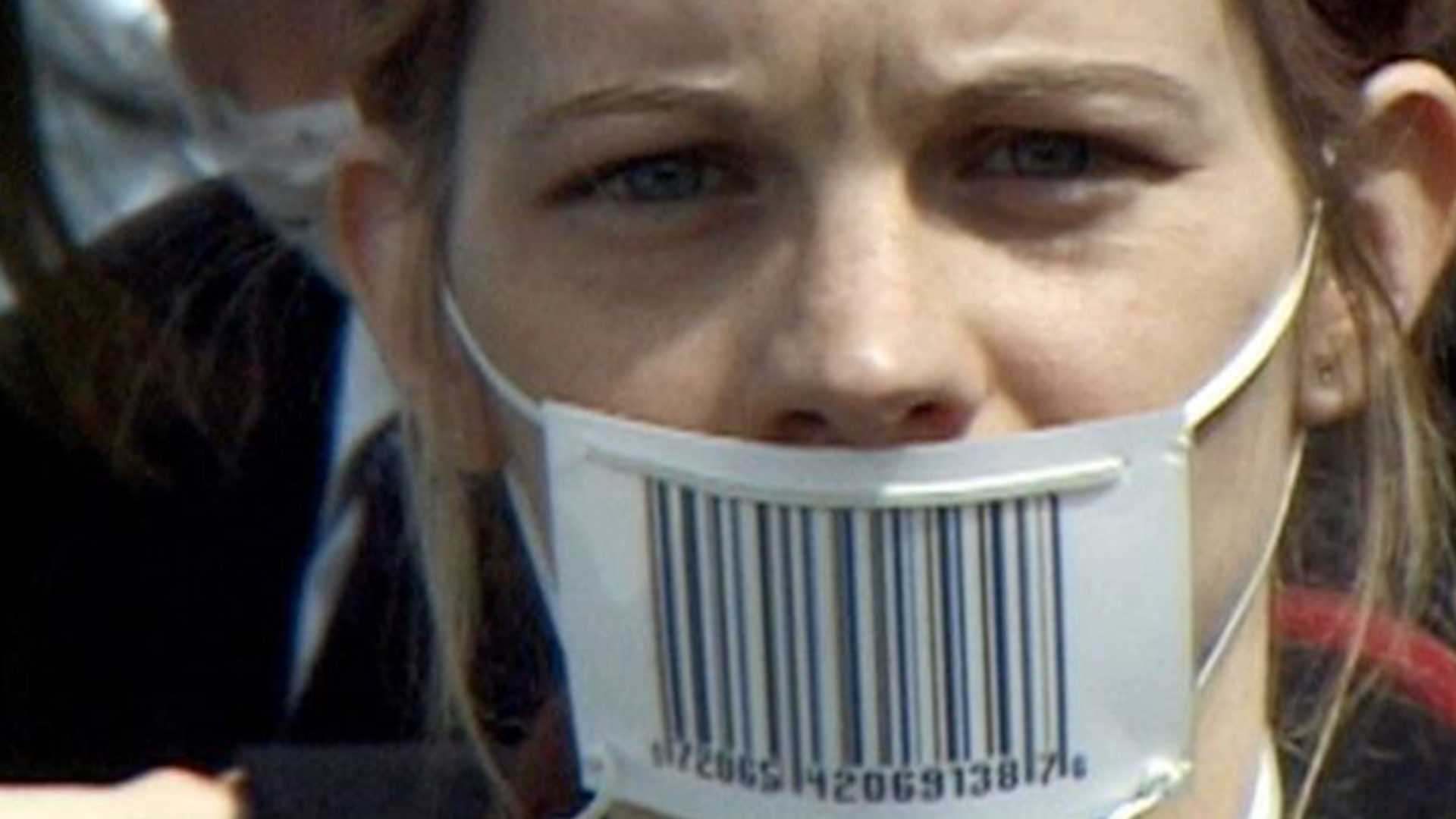Provoking, witty, stylish and sweepingly informative, The Corporation explores the nature and spectacular rise of the dominant institution of our time. Part film and part movement, The Corporation is transforming audiences and dazzling critics with its insightful and compelling analysis. Taking its status as a legal « person » to the logical conclusion, the film puts the corporation on the psychiatrist’s couch to ask « What kind of person is it? » The Corporation includes interviews with 40 corporate insiders and critics – including Noam Chomsky, Naomi Klein, Milton Friedman, Howard Zinn, Vandana Shiva and Michael Moore – plus true confessions, case studies and strategies for change.
Among the
40 interview subjects are CEOs and top-level executives from a range of industries: oil, pharmaceutical, computer, tire, manufacturing, public relations, branding, advertising and undercover marketing; in addition, a Nobel-prize winning economist, the first management guru, a corporate spy, and a range of academics, critics, historians and thinkers are also interviewed.
A LEGAL « PERSON »
In the mid-1800s the corporation emerged as a legal « person. » Imbued with a « personality » of pure self-interest, the next 100 years saw the corporation’s rise to dominance. The corporation created unprecedented wealth but at what cost? The remorseless rationale of « externalities » (as Milton Friedman explains, the unintended consequences of a transaction between two parties on a third) is responsible for countless cases of illness, death, poverty, pollution, exploitation and lies.
THE PATHOLOGY OF COMMERCE: CASE HISTORIES
To assess the « personality » of the corporate « person, » a checklist is employed, using diagnostic criteria of the World Health Organization and the standard diagnostic tool of psychiatrists and psychologists. The operational principles of the corporation give it a highly anti-social « personality »: it is self-interested, inherently amoral, callous and deceitful; it breaches social and legal standards to get its way; it does not suffer from guilt, yet it can mimic the human qualities of empathy, caring and altruism. Four case studies, drawn from a universe of corporate activity, clearly demonstrate harm to workers, human health, animals and the biosphere. Concluding this point-by-point analysis, a disturbing diagnosis is delivered: the institutional embodiment of laissez-faire capitalism fully meets the diagnostic criteria of a « psychopath. »
MINDSET
But what is the ethical mindset of corporate players? Should the institution or the individuals within it be held responsible? The people who work for corporations may be good people, upstanding citizens in their communities, but none of that matters when they enter the corporation’s world. As Sam Gibara, Former CEO and Chairman of Goodyear Tire, explains, « If you really had a free hand, if you really did what you wanted to do that suited your personal thoughts and your personal priorities, you’d act differently. »
Ray Anderson, CEO of Interface, the world’s largest commercial carpet manufacturer, had an environmental epiphany and re-organized his $1.4 billion company on sustainable principles. His company may be a beacon of corporate hope, but is it an exception to the rule?
MONSTROUS OBLIGATIONS
A case in point: Sir Mark Moody-Stuart recounts an exchange between himself (at the time Chairman of Royal Dutch Shell), his wife, and a motley crew of Earth First activists who arrived on the doorstep of their country home. The protesters chanted and stretched a banner over their roof that read, « MURDERERS. » The response of the surprised couple was not to call the police, but to engage their uninvited guests in a civil dialogue, share concerns about human rights and the environment and eventually serve them tea on their front lawn. Yet, as the Moody-Stuarts apologize for not being able to provide soy milk for their vegan critics’ tea, Shell Nigeria is flaring unrivaled amounts of gas, making it one of the world’s single worst sources of pollution. And all the professed concerns about the environment do not spare Ken Saro Wiwa and eight other activists from being hanged for opposing Shell’s environmental practices in the Niger Delta.
The Corporation exists to create wealth, and even world disasters can be profit centers. Carlton Brown, a commodities trader, recounts with unabashed honesty the mindset of gold traders while the twin towers crushed their occupants. The first thing that came to their minds, he tells us, was: « How much is gold up? »
PLANET INC.
You’d think that things like disasters, or the purity of childhood, or even milk, let alone water or air, would be sacred. But no. Corporations have no built-in limits on what, who, or how much they can exploit for profit. In the fifteenth century, the enclosure movement began to put fences around public grazing lands so that they might be privately owned and exploited. Today, every molecule on the planet is up for grabs. In a bid to own it all, corporations are patenting animals, plants, even your DNA.
Around things too precious, vulnerable, sacred or important to the public interest, governments have, in the past, drawn protective boundaries against corporate exploitation. Today, governments are inviting corporations into domains from which they were previously barred.
PERCEPTION MANAGEMENT
The Initiative Corporation spends $22 billion worldwide placing its clients’ advertising in every imaginable – and some unimaginable – media. One new medium: very young children. Their « Nag Factor » study dropped jaws in the world of child psychiatry. It was designed not to help parents cope with their children’s nagging, but to help corporations formulate their ads and promotions so that children would nag for their products more effectively. Initiative Vice President Lucy Hughes elaborates: « You can manipulate consumers into wanting, and therefore buying your products. It’s a game. »
Today people can become brands (Martha Stewart). And brands can build cities (Celebration, Florida). And university students can pay for their educations by shilling on national television for a credit card company (Chris and Luke). And a corporation even owns the rights to the popular song « Happy Birthday » (a division of AOL-Time-Warner). Do you ever get the feeling it’s all a bit much?
Corporations have invested billions to shape public and political opinion. When they own everything, who will stand for the public good?
THE PRICE OF WHISTLEBLOWING
It turns out that standing for the public good is an expensive proposition. Ask Jane Akre and Steve Wilson, two investigative reporters fired by Fox News after they refused to water down a story on rBGH, a controversial synthetic hormone widely used in the United States (but banned in Europe and Canada) to rev up cows’ metabolism and boost their milk production. Because of the increased production, the cows suffer from mastitis, a painful infection of the udders. Antibiotics must then be injected, which find their way into the milk, and ultimately reduce people’s resistance to disease.
Fox demanded that they rewrite the story, and ultimately fired Akre and Wilson. Akre and Wilson subsequently sued Fox under Florida’s whistle-blower statute. They proved to a jury that the version of the story Fox would have had them put on the air was false, distorted or slanted. Akre was awarded $425,000. Then Fox appealed, the verdict was overturned on a technicality, and Akre lost her award. [For an update on the case see Disc 2 where we learn that at one point, Jane and Steve became liable for Fox’s $1.8 million court costs, later to be reduced to $200,000.]
DEMOCRACY LTD.
Democracy is a value that the corporation just doesn’t understand. In fact, corporations have often tried to undo democracy if it is an obstacle to their single-minded drive for profit. From a 1934 business-backed plot to install a military dictator in the White House (undone by the integrity of one U.S. Marine Corps General, Smedley Darlington Butler) to present-day law-drafting, corporations have bought military might, political muscle and public opinion.
And corporations do not hesitate to take advantage of democracy’s absence either. One of the most shocking stories of the twentieth century is Edwin Black’s recounting IBM’s strategic alliance with Nazi Germany-one that began in 1933 in the first weeks that Hitler came to power and continued well into World War II.
FISSURES
The corporation may be trying to render governments impotent, but since the landmark WTO protest in Seattle, a rising wave of networked individuals and groups have decided to make their voices heard. Movements to challenge the very foundations of the corporation are afoot: The corporate charter revocation movement tried to bring down oil giant Unocal; a groundbreaking ballot initiative in Arcata, California, put the corporate agenda in the public spotlight in a series of town hall meetings; in Bolivia, the population fought and won a battle against a huge transnational corporation brought in by their government to privatize the water system; in India nearly 99% of the basmati patent of RiceTek was overturned; and W. R. Grace and the U.S. government’s patent on Neem was revoked.
As global individuals take back local power, a growing re-invigoration of the concept of citizenship is taking root. It has the power to not only strip the corporation of its seeming omnipotence, but to create a feeling and an ideology of democracy that is much more than its mere institutional version.




